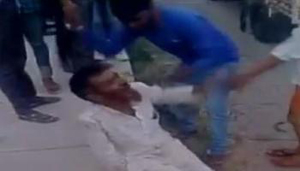Lucknow, May 4: The violence and barbarism unleashed by the activists of Hindu Yuva Vahini (HYV) in Uttar Pradesh in recent days has triggered alarm bells among state BJP leaders, who believe that non-BJP Hindutva group is harming the image of the government.

The seniors voiced their unease about the dominance of HYV, an outfit formed by Chief Minister Yogi Adityanath, at the state BJP executive committee meeting.
Ghulam Ahmed, a resident of Sohi village in the district, was beaten to death by suspected members of the outfit on Tuesday.
The police on Wednesday arrested 14 people in connection with the lynching. Incidentally, it was not the first time that HYV activists had turned murders since Adityanath assumed charge of the state in March.
They had earlier publicly assaulted a Muslim youth and dragged him to the police station, accusing him of what they termed love jihad.
Last month, scores of HYV activists had barged into a church in Maharajganj district during a prayer and assaulted the priests, saying they were “forcing'” people to convert to Christianity.
Back-stabbers, beware
State BJP president Keshav Prasad Maurya, while addressing the executive committee meeting, dropped enough indication that he was referring to HYV when he said that some people who were not part of the BJP were trying to sideline genuine party workers and bringing a bad name to the government.
“Any attempt to sideline genuine workers will not be tolerated... we will not allow outsiders to push our workers behind... we will not spare back-stabbers,” Maurya said at the meeting,which concluded on Tuesday. Though Adityanath was present when Maurya made the remarks, he chose to remain silent.
State BJP sources said that similar concerns had been aired during the party leaders’ meeting with RSS?functionaries here a few days ago.
College boy held in lynching case
The Alwar police on Tuesday detained a 17-year-old boy in connection with the Pehlu Khan lynching case. The accused was identified on the basis of a video footage, which had gone viral following the attack, said the police.
In the video, the accused, who is a Class 12 student, could be clearly seen assaulting Khan. OnApril 1, Khan and four others were assaulted when they were transporting cows.








Comments
Add new comment